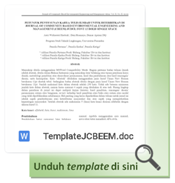SUSTAINABILITY ANALYSIS OF THE APPLICATION OF WASTE BANK IN ELEMENTARY SCHOOL WITH A MULTIDIMENSIONAL SCALING APPROACH
DOI:
https://doi.org/10.23969/jcbeem.v5i2.4535Keywords:
Management, Multidimensional scaling method, Waste bankAbstract
Waste banks are one of the waste management that have the potential to reduce the burden of waste in the final processing site. Until now, there is a large amount of waste banks to accommodate waste from the surrounding environment. Bandung, as a city that experienced a waste emergency in 2005, has encouraged its citizens to operate waste banks, both school scale, neighborhood and for a larger scope. Bandung City Government also cooperates with several waste banks to conduct several programs with the aim to increase public awareness of environmental cleanliness. Waste banks that have been built mostly do not come with good management, so some waste banks only feasible in a short time. The purpose of this study is to obtain a waste bank management model based on existing conditions using the Multidimensional Scaling Method. This method exploring data provides a visual picture of the proximity patterns in the form of similarities or distances between a set of objects. This method will be useful for the formulation of waste bank sustainability recommendations in its marketing strategy and diversification of its business without reducing the essence of waste banks as part of environmental management. The representation of the waste bank that was used as the object of the study was the Rafi' Elementary School Waste Bank. Data processing uses Rapfish/Rap-Bash software with multidimensional scale methods. Data processing results are used to formulate the sustainability strategy of waste banks.
Downloads
References
Nababan, B.O., Sari, Y.D., Hermawan, M. (2007). Analisis Keberlanjutan Perikanan Tangkap Skala Kecil di Kabupaten Tegal Jawa Tengah. J. Bijak dan Riset Sostek KP, 2(2): 137-158.
Walker, C. & Baxter, J. (2019). Method Sequence and Dominance in Mixed Methods Research: A Case Study of the Social Acceptance of Wind Energy Literature. International Journal of Qualitative Methods, 18:1-4.
Triana, A.P. & Sembiring, E. Evaluasi Kinerja dan Keberlanjutan Program Bank Sampah sebagai Salah Satu Pendekatan dalam Pengelolaan Sampah dengan Konsep 3R. Jurnal Teknik Lingkungan, 24(2): 69-78.
Yustiani, Y.M., Rochaeni, A. & Aulia, E. (2019). Konsep Pengelolaan Sampah di Desa Babakan, Kabupaten Bandung. EnviroScienteae, 15 (1), pp. 121-126.
Yustiani, Y.M., Abror, D.F. (2019). Operasional Bank Sampah Unit dalam Pengelolaan Sampah Perkotaan. JURNALIS: Jurnal Lingkungan dan Sipil. Vol. 2 (2), pp.82-89.














